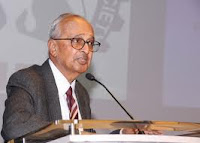Acting on two Public Interest Litigations (PILs), the Apex Court of India on Wednesday ordered a probe into alleged fake encounters in Gujarat by a monitoring authority headed by retired SC Judge M B Shah. The panel will probe encounters between 2003 and 2006 and submit a report in three months to decide whether the cases of fake encounters require independent investigation or not.
 |
| Noted Journalist Vergese |
The two PILs were filed by noted journalist BG Verghese and lyricist Javed Akhtar. The PIL of Mr Verghese is on human ground and is seeking for system development, where as that of Javed Akhtar is with hidden political tone behind the litigation.
BG Verghese was an information adviser to former prime minister Indira Gandhi during 1966-69 and wrote her speeches, but dared to criticise on her decision for imposing emergency on the country during 1975. He was awarded the Ramon Magsaysay award later. A crusader for civil rights, Verghese has long worked on problems of development. He also on the Editors Guild of India Fact Finding Mission after the Gujarat riots, 2002
Public Interest Litigation (PIL) was filed by him seeking an inquiry into 21 alleged fake encounter killings by the police in Gujarat between 2003 and 2006. These 21 encounters included some workmen, who had come to Gujarat from outside the state, as suspected terrorists.
"It is not clear if the families are even aware of the fate of these young persons. Six of those killed were in police custody. It seems incredible that they would have possessed arms in custody so as to warrant killing by the police in self defence as is stated by the government," he had said in the petition.
In his PIL Verghese had claimed that the pattern of killings showed there was a need for investigation. He has sought a direction to the Centre and Gujarat to order an inquiry into the encounter killings and compensation to the next of kin, where warranted. He also sought action against errant officials and a scheme to ensure accountability in all cases of custodial encounter.
Noted lyrist Javed Akhtar, who jointly filed the petition along with social activist Shabnam Hashmi said in his petition citing some media reports. "It appears from all the incidents of fake encounters, a pattern has emerged of killing innocent people, particularly from the Muslim community, on the pretext of their being dreaded terrorists and conspiring to kill the chief minister of the state at the behest of terrorist group like JeM,"
 |
| D G Vanzara Cop Behind encounters |
This PIL alleged it has become a trend in Gujarat to demonise Muslims by declaring them dreaded terrorists and thereafter killing them in fake encounters. in almost all these incidents, the same group of police officials led by D G Vanzara, arrested in connection with Sohrabuddin Sheikh's killing, have been found to be involved and in many such incidents there has been a massive cover-up.
An involvement of a conspiracy hatched by Pakistan's Inter Services Intelligence (ISI) and Jaish-e-Mohammed (JeM) to assassinate Gujarat Chief Minister Narendra Modi and other leaders were the common bytes given to media by police during that time period.
With so many investigations going around a monitoring authority headed by Justice Shah was set up by the Gujarat government last year to oversee investigations by the Special Task Force probing fake encounters. When the Gujarat government informed the court that a monitoring authority had already been appointed by the state, the Court said that it would ask this panel to probe the fake encounters.
The Supreme Court is hearing a bunch of petitions against fake encounters in Gujarat between 2002 and 2006. The Court has given authority to Justice Shah to appoint its own officers and call for records from the state government and the Human Rights Commission. It can also hear the victims' kin on compensation pleas, the court said.
Other Posts :













